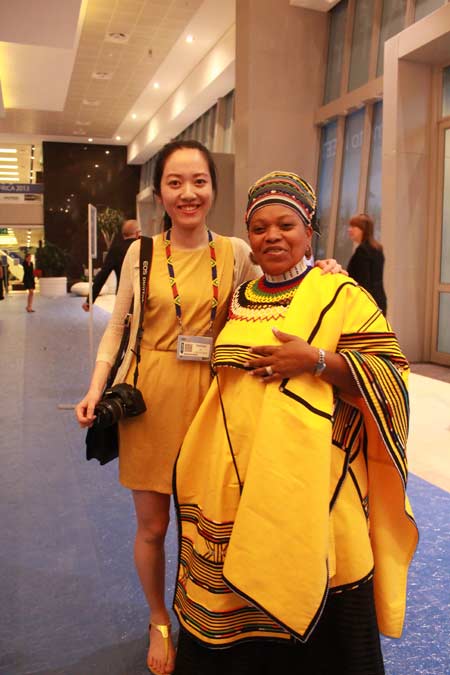Finding your perfect English name
By Tiffany Tan ( China Daily ) Updated: 2014-03-12 07:23:17
 |
|
Ji Yanyan, or Cereal, attends a travel trade industry event in South Africa last year. |
Pasden, who has since built a linguistics, education and technology career in China, believes it is teachers' responsibility to inform non-native speakers that English names cannot be chosen at random. Names are a kind of English vocabulary and how they are chosen reflects a cultural tradition, he says in the blog post.
The knowledge will be particularly helpful, Pasden says in a recent e-mail, to people who plan to live in predominantly English-speaking countries and do not want their names to be the target of ridicule.
Choosing unusual English names is not peculiar to the mainland Chinese. This is a manifestation of how various countries are assimilating English into their native cultures, says Stephen Matthews, a linguistics professor specializing in bilingualism at the University of Hong Kong.
"This is something we recognize to be normal. English begins to diverge as soon as it goes to a different part of the world," he says, citing Australia, Singapore and Hong Kong as examples.
Since mainland Chinese do not speak standard English, and most will always live in their native country, Matthews thinks it is nonessential for them to choose conventional English names.
Hang Haojie, for one, has found a way to navigate the land mine of English naming.
The native of Shanghai, who now works in Seattle, goes by his Chinese given name's initials HJ whenever he is around colleagues or casual acquaintances. But when it is just him and old friends, the 26-year-old goes back to being Hungry, a name bestowed on him as a middle school student in China, because of his voracious appetite.
Xing Yi and Guo Xin contributed to this story.
|
|
|
|
|
|
|
|























 Raymond Zhou:
Raymond Zhou: Pauline D Loh:
Pauline D Loh: Hot Pot
Hot Pot Eco China
Eco China China Dream
China Dream China Face
China Face





